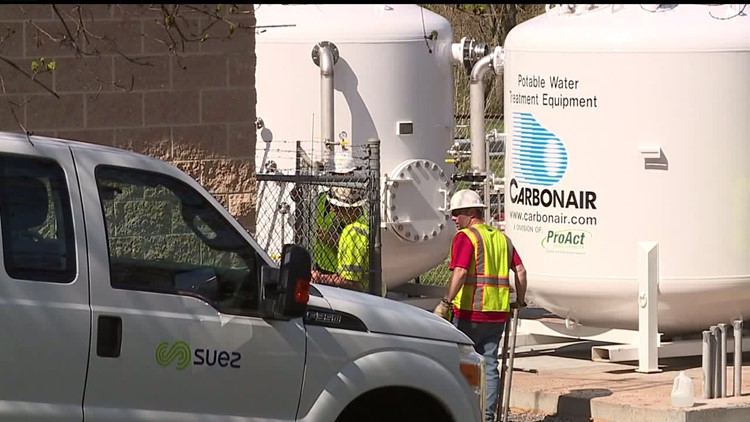YORK COUNTY, Pa. -- Two of Suez Water's wells that exceeded the Environmental Protection Agency's Health Advisory Limit for PFAS chemicals (70 parts per trillion) and are now below said limit, according to the state Department of Environmental Protection (DEP).
Coppersmith and Dupont wells -- at the Dupont treatment building -- had 131 parts per trillion and 168.1 parts per trillion, respectively, when the PA DEP took raw water samples. Following the installation and utilization of carbon treatment, the combined parts per trillion was at 12.89, the Pennsylvania DEP said.
The Pennsylvania DEP also re-tested water at the Conley Lane treatment building (Playground and Conley wells) which showed no signs of PFAS.
"We are very pleased with the performance of the treatment and results of additional testing," said John Hollenbach, Vice President and General Manager of SUEZ. "Our mission was to act as quickly as possible on behalf of our customers. We are thankful for their patience, for the cooperation of the Pennsylvania DEP, and for our employees who worked tirelessly to resolve this issue."
The Pennsylvania DEP noted that it took water samples from nine of Suez Water's ten wells. PFAS levels were detected in all nine, seven of which tested below the Health Advisory Limit.
The testing was brought about after a SUEZ customer's independent test found more than double (186 parts per trillion) the Health Advisory Limit for PFAS in their water.
PFAS, or per- and polyfluoroalkyl substances, are, according to SUEZ Water, part of a family of man-made chemicals that have been used for decades as an ingredient to make products that resist heat, oil, stains, grease and water, and are extremely resistant to breakdown in the environment.
The water company added that these chemicals are considered a "lifetime" health impact, meaning you'd have to consume it over a lifetime to see health risks, as opposed to an immediate health harm.
The state Department of Health says PFAS and PFOA are chemicals that have unconfirmed links to health issues including liver damager, high blood cholesterol, some increases in kidney, prostate and testicular cancers in people exposed to higher levels, and potential birth defects.
Suez Customer Jamie Casey of Newberry Township said despite the results, she isn't convinced the water is safe.
Casey, who said her family did not receive a PFAS advisory notice, says she lost trust in SUEZ after learning about the issue, indirectly, through social media.
“If somebody would take some responsibility, that would go a long way because they haven’t at least taken the responsibility. It’s just "Well, we didn’t get a notice so, you know, we didn’t have an issue." I don’t believe that. I don’t believe that at all. I think anyone who has Suez water should be concerned,” said Casey.
SUEZ officials say PFAS were first addressed as a potential issue starting in 2009.
Casey said she has dealt with thyroid and kidney issues within that timeframe.
“That concerns me because we lived here then and my kids drink the water and I drank the water, I have some significant health problems and all the things that they say the water could affect has affected me...I have issues and I’m scared. Did the water do it? I don’t know. We have pets, I don’t give them the water since this whole thing came out, since the first day since we read it on Facebook. I bought water and it really pisses me off because I pay for water and now I have to pay again for water because I can’t drink the water that comes out of my sink so it’s really upsetting,” said Casey.
She said she now buys bottled water to drink and cook, no longer allowing her children to drink the public water.
Gary Sebolt, a SUEZ customer also of Newberry Township who received a PFAS notice, said he's comfortable with the water and the treatment filters added onto the wells.
“With what they’re telling us, I mean it’s such a minute…particles involved with this, I don’t think it’s an issue, period. But I’m glad someone is trying to do something about it,” said Sebolt.
He agrees with Casey that communication from SUEZ was "untimely," given the situation.
SUEZ customer Robert Getz, who received the same notice as Sebolt, said he feels "better" about the situation after hearing the results.
He said he is still questioning whether PFAS has a long-term health impact.
“I hope it stays this way and I hope we don’t have any more problems so I hope they stay on top of it and test it regularly right from the SUEZ water when they send it out to us, instead of relying on a customer to test it, independently, and finds out its a mess,” said Getz.
The state Department of Environmental Protection is still investigating the source of the contamination and potential responsible parties.



